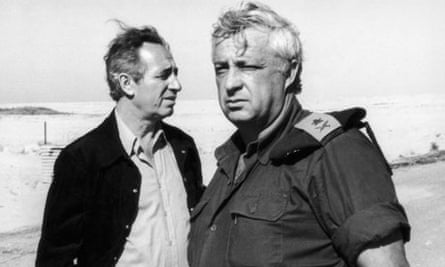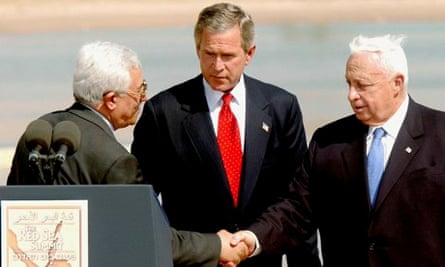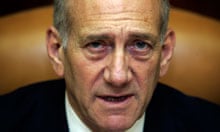Ariel Sharon, the controversial self-styled "warrior" who dominated Israel's military and political landscape for decades, has died eight years after a massive stroke left him in a vegetative state.
The former army general and prime minister suffered multiple organ failure over the new year. His sons were at his bedside at the Sheba Medical Centre, a long-term care facility near Tel Aviv, where Sharon has lain since May 2006.

His son Gilad said: "He has gone. He went when he decided to go."
Shlomo Noy, of the medical centre, told reporters that Sharon had "struggled with surprising strength and determination" against multiple medical complications since his stroke. "Today he departed peacefully with his family by his side."
Television networks interrupted their scheduled coverage to break the news. But Sharon's death, at the age of 85 and after eight years in a coma, was less of a shock to Israel than the devastating stroke that felled him on 4 January 2006 at the height of his premiership.

Even so, for many Israelis he will be mourned as a giant figure who played a key role in shaping Israel both as a soldier and a statesman. His passing severs the last link to the iconic generation which fought in the 1948 war that followed the declaration of the state. His reputation as a fearless – and controversial - soldier was matched by his uncompromising ideology as a politician.
Among Palestinians and leftwing Israelis, he will be remembered as a powerful and reviled champion of Israel's colonial settlement project, and the political force behind the construction of the vast concrete and steel separation barrier that snakes through the West Bank. Many will not forgive him for failing to prevent the killing by Lebanese Christian forces of hundreds of Palestinians and Lebanese Shia in the Sabra and Shatila refugee camps in Beirut in 1982.

His body is expected to lie at the Israeli parliament, the Knesset, to allow members of the public to pay their respects ahead of an official state ceremony, to which international figures will be invited. The former prime minister is expected to be buried at his ranch in the Negev desert, next to his wife's grave.
Using Sharon's nickname, the Israeli president, Shimon Peres, paid tribute to the former prime minister.
"My dear friend, Arik Sharon, lost his final battle today. Arik was a brave soldier and a daring leader who loved his nation and his nation loved him. He was one of Israel's great protectors and most important architects, who knew no fear and certainly never feared vision. He knew how to take difficult decisions and implement them. We all loved him and he will be greatly missed."
Danny Ayalon, former deputy foreign minister, said Sharon was a giant, both militarily and politically. "He could be very tough on the battlefield but very reasonable in the political sphere. That's what made him very special."
Barack Obama said: "On behalf of the American people, Michelle and I send our deepest condolences to the family of former Israeli prime minister Ariel Sharon and to the people of Israel on the loss of a leader who dedicated his life to the state of Israel."
David Cameron said: "Ariel Sharon is one of the most significant figures in Israeli history and as prime minister he took brave and controversial decisions in pursuit of peace, before he was so tragically incapacitated. Israel has today lost an important leader." Ed Miliband said: "Nobody can doubt the impact he had on Middle East politics."
Sharon suffered a first stroke on 18 December 2005 at the age of 77. The prime minister had long indulged his gargantuan appetite for rich food and cigars, despite doctors' repeated warnings that he needed to lose weight and take exercise. The prime minister was kept in hospital for 48 hours.
Seventeen days later Sharon had another, much bigger, stroke at his Negev ranch. Despite paramedics urging his immediate transfer to the nearest major hospital, one of Sharon's personal doctors insisted the prime minister should be kept at home until the physician could personally examine him.
However, following a further collapse while waiting for the doctor's arrival, an ambulance was called. Instead of being taken to the nearest hospital, the doctor directed the ambulance staff to drive to the Hadassah hospital on the outskirts of Jerusalem, a journey of around an hour.
Sharon underwent several long operations but never recovered consciousness. Four months after the stroke he was transferred to a long-term medical facility near Tel Aviv, where he remained – apart from one brief home visit in 2010 to assess whether he could be moved to his Negev ranch – until his death on Saturday.
There was a glimmer of hope last January when doctors said the former prime minister had exhibited "robust activity" in his brain during tests. Scans showed Sharon responding to pictures of his family and recordings of his son's voice. However, medical experts said the chances of him regaining consciousness were almost zero.
Sharon – known as "Arik" to his friends, "the Bulldozer" to his critics – was a giant figure, both literally and metaphorically, in Israel. He was accused of war crimes after between 800 and 2,000 Palestinians were butchered at the Sabra and Shatila refugee camps in 1982 in Lebanon by Phalangist Christians while Israeli forces stood by. Sharon was defence minister at the time.
But his reputation as a belligerent and uncompromising rightwinger was challenged in the period immediately preceding his stroke by his astonishing decision to withdraw Israeli forces and settlers from the Gaza Strip, and his determination to carry out the evacuation in the face of virulent opposition and accusations of betrayal.
Analysts were divided over whether the man who had been a driving force of the settlement enterprise then intended to initiate a much more complex withdrawal of settlers from the West Bank, or whether he had "sacrificed" Gaza in order to maintain Israel's hold on the West Bank and East Jerusalem.
Following his incapacitation, Ehud Olmert assumed the role of prime minister. Kadima, the party Sharon founded after breaking with the rightwing Likud shortly before his demise, won the largest number of seats, with Olmert at its helm, in the general election of March 2006.
Kadima, on the centre-right of the Israeli political spectrum, was predicted to reshape the electoral landscape. But the party has floundered in the vagaries of Israeli politics, with its multitude of parties and unstable proportional representation electoral system. In last January's election, the party won only two seats.
Olmert was seen as technocratic leader in contrast to the colourful, ideological, strongman image that Sharon enjoyed.
In a foreword to Sharon's autobiography, Warrior, the late Israeli journalist Uri Dan wrote: "Though much of the world knows him by the title of this autobiography, he is fundamentally a man of peace." Many assessments of Sharon's life and legacy will dispute that.






